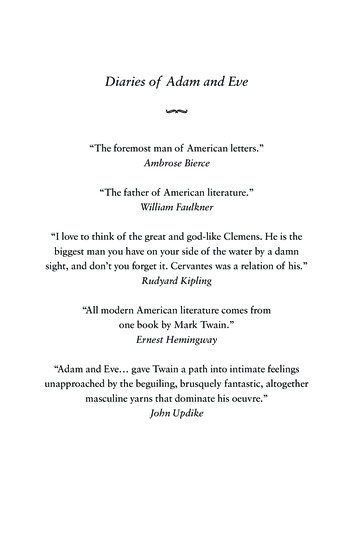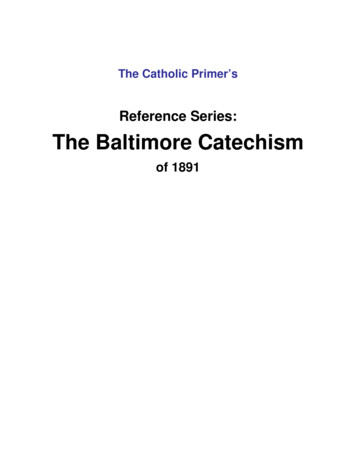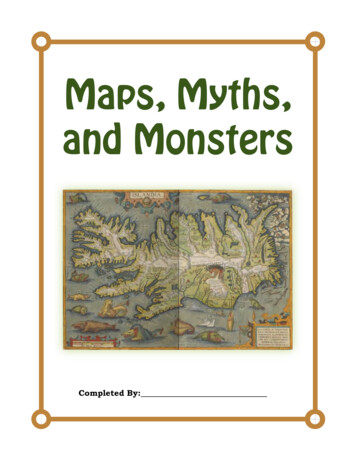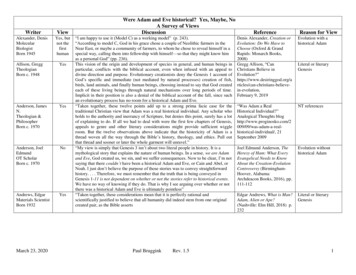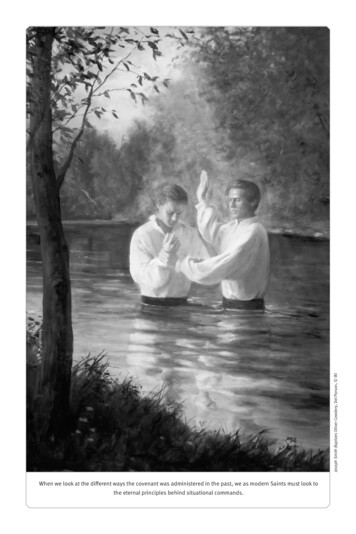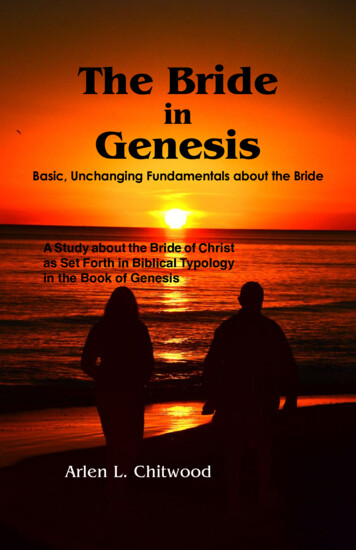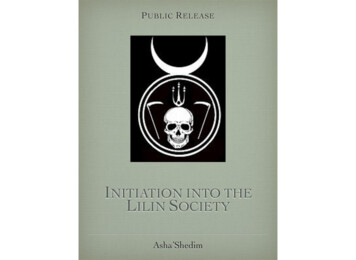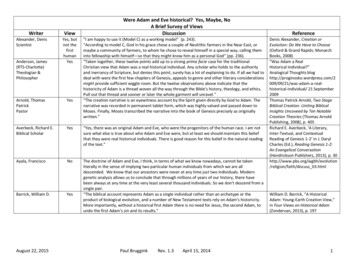
Transcription
WriterAlexander, DenisScientistAnderson, James(RTS-Charlotte)Theologian &PhilosopherViewYes, butnot thefirsthumanYesWere Adam and Eve historical? Yes, Maybe, NoA Brief Survey of ViewsDiscussion“I am happy to use it (Model C) as a working model” (p. 243).“According to model C, God in his grace chose a couple of Neolithic farmers in the Near East, ormaybe a community of farmers, to whom he chose to reveal himself in a special way, calling theminto fellowship with himself—so that they might know him as a personal God” (pp. 236).“Taken together, these twelve points add up to a strong prima facie case for the traditionalChristian view that Adam was a real historical individual. Any scholar who holds to the authorityand inerrancy of Scripture, but denies this point, surely has a lot of explaining to do. If all we had todeal with were the first few chapters of Genesis, appeals to genre and other literary considerationsmight provide sufficient wiggle room. But the twelve observations above indicate that thehistoricity of Adam is a thread woven all the way through the Bible’s history, theology, and ethics.Pull out that thread and sooner or later the whole garment will unravel.”“The creation narrative is an eyewitness account by the Spirit given directly by God to Adam. Thenarrative was recorded in permanent tablet form, which was highly valued and passed down toMoses. Finally, Moses transcribed the narrative into the book of Genesis precisely as originallywritten.”Arnold, ThomasPatrickPastorYesAverbeck, Richard E.Biblical ScholarYes“Yes, there was an original Adam and Eve, who were the progenitors of the human race. I am notsure what else is true about who Adam and Eve were, but at least we should maintain this beliefthat they were real historical individuals. There is good reason for this belief in the natural readingof the text.”Ayala, FranciscoNoBarrick, William D.YesThe doctrine of Adam and Eve, I think, in terms of what we know nowadays, cannot be takenliterally in the sense of implying two particular human individuals from which we are alldescended. We know that our ancestors were never at any time just two individuals. Moderngenetic analysis allows us to conclude that through millions of years of our history, there havebeen always at any time at the very least several thousand individuals. So we don't descend from asingle pair.“The biblical account represents Adam as a single individual rather than an archetype or theproduct of biological evolution, and a number of New Testament texts rely on Adam’s historicity.More importantly, without a historical first Adam there is no need for Jesus, the second Adam, toundo the first Adam’s sin and its results.”August 22, 2015Paul BrugginkRev. 1.3April 15, 2014ReferenceDenis Alexander, Creation orEvolution: Do We Have to Choose(Oxford & Grand Rapids: MonarchBooks, 2008)“Was Adam a RealHistorical Individual?”Analogical Thoughts -adam-a-realhistorical-individual/ 21 September2009Thomas Patrick Arnold, Two StageBiblical Creation: Uniting BiblicalInsights Uncoveed by Ten NotableCreation Theories (Thomas ArnoldPublishing, 2008), p. 405Richard E. Averbeck, ‘A Literary,Inter-Textual, and ContextualReading of Genesis 1-2’ in J. DarylCharles (Ed.), Reading Genesis 1-2:An Evangelical Conversation(Hendrickson Publishers, 2013), p. /discuss 03.htmlWilliam D. Barrick, “A HistoricalAdam: Young-Earth Creation View,”in Four Views on Historical Adam(Zondervan, 2013), p. 1971
WriterViewBarth, KarlTheologianNoBeidler, MikeNoBerry, R. J.ScientistYesBird, Michael F.YesBlocher, HenriYesBlomberg, Craig L.Boyd, GregAugust 22, 2015ProbablyMaybeWere Adam and Eve historical? Yes, Maybe, NoA Brief Survey of ViewsDiscussionReference“Karl Barth, the father of Neo-orthodoxy, taught that what we have in Gen. 3 is not history butsaga, a term he preferred to the term "myth" because he felt that "myth" still suggested, perhaps,some connection with history, nebulous though it might be; and he wanted to emphasize thatAdam is not at all to be thought of as an historical person but rather as a symbol which stands forevery person who has ever lived. "We are all Adam," Barth said, which simply means that we areall sinners. In fact, there was never a time when man was not a sinner and therefore guiltlessbefore God.”“While the scientific evidence of our primordial heritage is clearly recorded in our DNA and arguesforcefully against a historical Adam and Eve — traditionally understood to be the first pair ofhuman beings created de novo approximately 6000 years ago — our collective observations andhuman experience argue just as forcefully that we are spiritual victims of our own genes.”Robert B. Strimple, “Was /resource/was-adamhistorical“A number of conservative scholars, while not taking the narrative of Genesis 2-3 literally, findgrounds in the New Testament for defending the historicity of Adam and Eve. Berry, for example,writes: ‘Paul’s carefully constructed analogy between Adam and Christ depends on the equalhistoricity of both (Romans 5:12-19; see also 1 Corinthians 15:21, 45) (R. J. Berry, ‘This CursedEarth: Is “the Fall” Credible?’ Science and Christian Belief, 11:1, 29-49)“Because I am convinced by cosmology and geology that the earth is old and find nothing inScripture to contradict that. I lean toward progressive creationism as the most biblically andscientifically satisfying option. Even so, I maintain belief in a literal Adam and Eve for severalreasons:” [genetics, genre, Paul in NT]“Though we feel uncomfortable with all the uncertainties when we try to correlate scientific dataand the results of a sensible interpretation of Genesis 1.4, we may maintain as plausible thehypothesis that the biblical Adam and Eve were the first parents of our race, some 40,000 yearsago.”“I would support an old-earth creationism and opt for a combination of progressive creation andliterary-framework approach to Genesis 1. I lean in the direction of [Derek] Kidner’s approach toGenesis 2-3 but am open to other proposals.”John J. Bimson, “Doctrines of the Falland Sin After Darwin,” in Michael S.Northcott and R. J. Berry (Eds.),Theology after Darwin (MiltonKeynes: Paternoster, 2009), p. 114Michael F. Bird, EvangelicalTheology: A Biblical and SystematicIntroduction (Zondervan, 2013), p.654Henri Blocher, Original Sin (GrandRapids: Eerdmans, 1997), p. 42.“I am currently inclined to the view that Adam was, in fact, a historical figure. At the same time,the fact that I say I am “inclined” toward this view indicates that I do not see this belief as centralto the orthodox Christian faith.”Paul BrugginkRev. 1.3April 15, 2014Mike Beidler, “A Response to TimKeller’s “Killer Argument” Against aMythological Adam,” from his blog“Rethinking the Alpha and Omega,”June 13, 2011Craig L. Blomberg, Can We StillBelieve the Bible: An EvangelicalEngagement with ContemporaryQuestions (BrazosPress, 2014), p.177Gregory A. Boyd, “Whether or NotThere was a Historical Adam, OurFaith Is Secure,” in Four Views onHistorical Adam (Zondervan, 2013),p. 2552
WriterViewWere Adam and Eve historical? Yes, Maybe, NoA Brief Survey of ViewsDiscussionBurge, TedNoCaneday, A. B.YesClouser, RoyNo“Although there is a long theological tradition taking Adam and Eve to be the biological ancestorsof all humans, I can find no warrant for it anywhere in the Hebrew Scriptures or in the NewTestament. The closest thing to any assertion on the topic is Adam’s remark calling Eve ‘themother of all living’; but that is in connection with her being promised that one of her descendantswill be the Messiah.”Collins, C. JohnYes“Genesis 2 leaves us with a distinct human pair. From Genesis 2-3 we may further infer thefollowing: (1) All humans have this pair, Adam and Eve, as their ultimate ancestors . . .” (p. 254)Collins, Francis S.Scientist“Apart from some general considerations, such as the implication that sin angers God and leads topunishment, sometimes tempered with mercy, there is not much evidence in these [Genesis]stories concerning what Christians should believe today. Some are most unlikely to be based onhistorical events. . . These stories depend on the deep-seated beliefs of the writers and giveevidence of how much more developed is the New Testament understanding of God” (p. 98).“They [Christians} know that they cannot believe in the historicity of Christ Jesus without alsobelieving in the historicity of Adam.”No (?)“Many sacred texts do indeed carry the clear marks of eyewitness history, and as believers wemust hold fast to these truths. Others, such as the stories of Job and Jonah, and of Adam and Eve,frankly do not carry the same historical ring” (p. 209).Collins, RobinPhilosopherYes“I would suggest that ‘Adam’ should also be understood as having a historical reference, as alsorepresenting what could be called the ‘stem-father’ of the human race. In evolutionary terms, sucha ‘stem-father’ would be the first group of evolving hominids who gained moral and spiritualawareness. ” (p. 486)Cunningham, ConorTheologian &PhilosopherNo“It is folly to interpret the Fall or the existence of Adam in either positivistic terms or strictlyhistorical terms, in the sense that there is no Fall before Christ.” (p. 378)August 22, 2015Paul BrugginkRev. 1.3April 15, 2014ReferenceTed Burge, Science & the Bible:Evidence-Based Christian Belief(Philadelphia: Templeton FoundationPress, 2005)B. Caneday, “The Language of Godand Adam’s Genesis & Historicity inPaul’s Gospel,” Southern BaptistJournal of Theology, 15.1 (2011), p.26Roy Clouser, “Is Theism Compatiblewith Evolution?,” in IntelligentDesign Creationism and Its Critics:Philosophical, Theological, andScientific Perspectives, edited byRobert T. Pennock (Cambridge: TheMIT Press, 2001), p. 534, fn 7C. John Collins, Genesis 1-4: ALinguistic, Literary, and TheologicalCommentary (Phillipsburg, NJ: P&RPublishing, 2006)Francis S. Collins, The Language ofGod: A Scientist Presents Evidencefor Belief (New York: Free Press,2006)Robin Collins, “Evolution andOriginal Sin,” in Perspectives on anEvolving Creation, Keith Miller,Editor (Grand Rapids: William B.Eerdsmans, 2003)Conor Cunningham, Darwin’s PiousIdea: Why the Ultra-Darwinists andCreationists Both Get It Wrong(Grand Rapids: Eerdsmans, 2010)3
WriterViewWere Adam and Eve historical? Yes, Maybe, NoA Brief Survey of ViewsDiscussionDavidson, G. R.Yes“There was a literal Adam and Eve, a Garden of Eden, and original sin.”Day, Allan J.NoDembski, WilliamYesDomning, Daryl P.ScientistNoDunn, JamesNo“It is therefore possible to envisage two ‘Biblical Adams’, the first a generic Adam, humanity, inGen. 1-3, with a more definitive historic individual Adam taking shape in Gen. 4 and beyond. Thegenerations of historical (Neolithic) Adam link him forward to the subsequent patriarchs, to Noahand to Abraham and on to David and to Christ in the enfolding story of the Old Testament and theNew. They are then expressed in terms of the toledoth formula and the Lucan genealogy of Christ(Luke 3:23-38). There is also a backwards link to humanity created in the image of God and sinful,in need of redemption by the second Adam. This is expressed in the story of the toledoth of theheavens and earth in Gen. 2-4 and its prologue, the Genesis 1 creation account. Gen. 2-3 thenbecome the story, the saga of generic Adam, of humanity, bringing out the way he (and we) are. Itis our story too, for we are all ‘in Adam’ and have need to be ‘in Christ’.” (p. 141)“Johnny T. Helms' concerns about my book THE END OF CHRISTIANITY as well as his concernsabout my role as a seminary professor in the SBC are unfounded. I subscribe to the Baptist Faithand Message 2000 as well as the Chicago Statement on Biblical Inerrancy. I believe Adam and Evewere literal historical persons specially created by God. I am not, as he claims, a theisticevolutionist.”“Advances in molecular genetics, however, have now made possible a much stronger statementthan these. It turns out that, while a hypothetical human population of the present size might havedescended from a single pair, the particular human population that now exists could not have. Ourpresent population includes far more genetic variety of a very ancient sort than could possiblyhave been transmitted to us by way of a single human couple.”“Dunn discusses and rejects the possibility that Adam can be regarded as merely a representativeman: ‘Paul does not use anthrōpos here to characterize humankind as a whole; the concept ofcorporate responsibility is more of a hindrance than a help’; he cites H. W. Robinson and F. F.Bruce in support. [James Dunn, Romans 1-8 (Word Biblical Commentary 38A; Dallas: Word, 1988,p. 272.] However, contra John Stott, he argues that ‘Paul’s theological point [in Rom. 5] does notdepend on Adam being a “historical” individual or on his disobedience being an historical event assuch. Such an implication does not necessarily follow from the fact that a parallel is drawn fromChrist’s single act: an act in mythic history can be paralleled to an act in living history without thepoint of the comparison being lost. [Ibid., p. 289]”August 22, 2015Paul BrugginkRev. 1.3April 15, 2014ReferenceG. R. Davidson, When Faith &Science Collide: A Biblical Approachto Evaluating Evolution and the Ageof the Earth (Oxford, Mississippi:Malius Press, 2009), p. 14Allan J. Day, “Adam, Anthropologyand the Genesis Record—TalingGenesis Seriously in Light ofContemporary Science,” Science &Christian Belief (1998), 10, 115-143Josh Rosenau, Thoughts from Kansasblog, January 8, 2010,http://scienceblogs.com/tfk/2010/01/bill dembski creationist.phpDaryl P.Domning, OriginalSelfishness: Original Sin and Evil inthe Light of Evolution (Ashgate,2006), p. 71.R. J. Berry, “Did Darwin DethroneHumankind?,” in R. J. Berry and T. A.Noble (Eds.), Darwin, Creation andthe Fall: Theological Challenges,(Nottingham: Apollos, 2009), pp. 6365].4
WriterEnns, PeterBiblical Scholar &TheologianFalk, DarrelScientistViewNoMaybeFischer, DickLay Bible scholarYesFrame, John M.YesGiberson, KarlScientistNoHamilton, AdamPastorNoAugust 22, 2015Were Adam and Eve historical? Yes, Maybe, NoA Brief Survey of ViewsDiscussion“There are two ways of looking at this parallel. You could say that the Adam story came first andthen the Israelites just followed that pattern. But there is another way. Maybe Israel’s historyhappened first, and the Adam story was written to reflect that history. In other words, the Adamstory is really an Israel story placed in primeval time. It is not a story of human origins but ofIsrael’s origins.”“Having said all this let me take a step or two back. I am not saying that this is ALL there is to theAdam story. There are all sorts of angles one can take to get at that extremely rich and deep pieceof theology. But the “Adam is Israel” angle is at the very least a very good one—and in my opiniona much better angle than seeing Adam as the first human and all humans are descended from him.Genesis does not support that reading.”“There is nothing in science which would say that God could not have begun his interaction withhumankind by entering into a relationship with a particular couple. After all, Christians believe thatGod interacted with a whole nation of people a while later, and then after that with all humankindthrough the coming of Christ. Science, I think we all know, is silent on these issues. Option #2 is aplace where many Christians can rest comfortably, both theologically and scientifically. . . Option#2 is still a possibility for Christians who hold to a historical Adam and Eve.”“Archaeologists place the beginnings of modern man at 10,000 years ago with the advent offarming techniques. Adam’s placement at roughly 7,000 years ago from the Genesis genealogies,coupled with the mention of farming in the Genesis text, makes this a compatible time frame. Thisputs Adam in relatively recent history not ancient history” (p. 189).“While not the first human, Adam was the first in God’s covenant line leading to Christ, and beganthe era of individual accountability.”“Scripture, in a number of ways, affirms the historicity of Adam and Eve, beyond asserting theirexistence in Genesis 1-5. Later references to them in Scripture always presuppose that they arehistorical figures. . . . In any case, it does not seem to me that the hypothesis under consideration[genetic evidence of a larger initial population] calls into question the special creation of Adam andEve in God’s image, their distinctive lordship over creation, or the historicity of the fall.”“Clearly, the historicity of Adam and Eve and their fall from grace are hard to reconcile with naturalhistory. The geological and fossil records make this case compelling. Nevertheless, scholars haveproposed many convoluted and implausible ways to resolve these tensions in the past couplecenturies” (p. 11)“It is interesting that the elements of the story [Genesis 1-3] clearly point in the direction of anarchetypal understanding of the story. The names Adam and Eve, not mentioned in the Creationstory in Genesis 1, are representational. In Hebrew, Adam simply means “man” or “human”(though it appears to have originated from a word meaning “of the ground,” thus pointing to Godcreating Adam from the dust of the earth). Eve means “life” or “bearer of life.” Both names aresymbolic. . . . “Paul BrugginkRev. 1.3April 15, 2014ReferencePeter Enns, “Adam is Israel,” Science& the Sacred, March 2, 2010,http://biologos.org/blog/adam-isisrael/Darrel Falk, “On Living in theMiddle,” Science & the ddle/, June 24, 2010Dick Fischer, The Origins Solution: AnAnswer in the Creation-EvolutionDebate (Lima, Ohio: Fairway Press,1996)Dick Fischer, “Historical Adam?,”Letters, PSCF, Vol. 62, No. 4,December 2010, pp. 304-305.John M. Frame, Systematic Theology:An Introduction to Christian Belief(P&R Publishing, 2013), pp. 803-806.Karl W. Giberson, Saving Darwin:How to Be a Christian and Believe inEvolution (New York: HarperOne,2008)Adam Hamilton, Making Sense of theBible: Rediscovering the Power ofScripture Today (HarperOne, 2014),p. 192)5
WriterViewHarlow, Daniel C.NoHarrell, Daniel M.YesHaught, John F.NoHill, CarolYesHorton, MichaelTheologianYesJeremiah, DavidYesWere Adam and Eve historical? Yes, Maybe, NoA Brief Survey of ViewsDiscussionRecent research in molecular biology, primatology, sociobiology, and phylogenitics indicates thatthe species Homo sapiens cannot be traced back to a single pair of individuals . . . . It is thereforedifficult to read Genesis 1-3 as a factual account of human origins. In current Christian thinkingabout Adam and Eve, several scenarios are on offer. The most compelling one regards Adam andEve as strictly literary figures—characters in a divinely inspired story about the imagined past thatintends to teach theological, not historical, truths about God, creation, and humanity.“Because the Genesis 2 account of humanity’s appearance is called an account (2:4), it perhapsshould be read as more report than poetry; literal rather than literary. Jesus, Paul, and othersthroughout Scripture all treat Adam and Eve as historical figures. As historical figures, there arebasically two options for their existence within the evolutionary rubric. The first is that God createdthem supernaturally, midstream in evolution’s flow. . . Another option might be to have Adam andEve exist as first among Homo sapiens, specially chosen by God as representatives for arelationship with him” (pp. 86-87).“Obviously an evolutionary understanding of life cannot be reconciled in a literal sense with thestory of a primordial couple, Adam and Eve, rebelling against God in the Garden of Eden andpassing down the consequences of their disobedience through our genetic history. The science ofevolution cannot and should not be made to conform literally to the mythic biblical accounts, andvice versa.”“We will now examine the ‘dual nature’ of the Genesis text regarding Adam and Eve andthe Garden of Eden. The Garden of Eden is considered to have been a historical place, the fourrivers of Eden (Gen. 2:10-14) pinpointing its location at the head of the Persian Gulf in today’sIraq.14 Adam and Eve and their patriarchal descendents are also considered to have beenhistorical people, as documented by the genealogies of the Bible. They are not considered to beallegorical or fictional persons, as is the common belief today, even among many Christians.However, Adam and Eve were not the first people to exist on planet earth – they were merelythe first in the line leading to Christ, which was the only line that the biblical authors wereconcerned about” (pp. 10-11).“Whatever one’s conclusions concerning the process of human origins, Christian theology standsor falls with a historical Adam and an historical fall. On this point, Roman Catholic and Reformationtheologies are at one. . . . However, if one does not take Adam (i.e., the human as human)seriously, two serious problems ensue: first, sin must be attributed to creation itself (and thereforeultimately to the Creator); second, there is no longer any historical basis for Christ’s work as theLast Adam, undoing the curse and fulfilling the terms of the covenant of creation.”Adam was created with apparent age.ReferenceDaniel C. Harlow, “After Adam:Reading Genesis in an Age ofEvolutionary Science,” inPerspectives on Science and ChristianFaith, Vol. 62, No. 3 (Sept. 2010), p.179Daniel M. Harrell, Nature’s Witness:How Evolution Can Inspire Faith(Nashville: Abingdon Press, 2008)John F. Haught, God After Darwin: ATheology of Evolution (WestviewPress, 2000), p. 137Carol A. Hill, “The WorldviewApproach to Biblical Interpretation,”(unpublished paper).Michael Horton, The ChristianFaith: A Systematic Theology forPilgrims On the Way (Zondervan,2011), pp. 424-425http://www.davidjeremiah.org/site/radio player.aspx?id 1409,BROADCAST DATE: 7/2/2014August 22, 2015Paul BrugginkRev. 1.3April 15, 20146
WriterViewJoseph, William G.NoKemp, Kenneth W.YesWere Adam and Eve historical? Yes, Maybe, NoA Brief Survey of ViewsDiscussion“Is it reasonable, probable, likely that after 3.5 billion years of evolution, during which death is theultimate fate of all living organisms and a part of the mechanism of evolution, suddenly thereevolved a creature which was immune to disease, fatal accident, pain and death? In spite of thefact that it eats food and thus would experience hunger, it appeared as an adult in a garden andwas destined to reproduce and multiply, it had no appetite or instinct it could not completelycontrol and found itself in perfect harmony with the only other member of its species, Eve. Howreasonable or probable is that? Most scientists are happy to grant that humanity displays adifference of kind from the rest of the animal kingdom, the ability to feel shame for example. Butthis account of human origin violates every fundamental characteristic of how nature works. Itdoes not seem reasonable that nature would function normally for 3.5 billion years and suddenlyeverything changes, but only temporarily and for only one species.” (p. 206)“There is an alternative use of Alexander’s distinction which does the work ofreconciliation without entailing the problems that his view faces. That accountcan begin with a population of about 5,000 hominids, beings which are in manyrespects like human beings, but which lack the capacity for intellectual thought.ReferenceWilliam G. Joseph, In Search of Adamand Eve: A Case for a Theology ofEvolution (CreateSpace Publishing,2011), p.Kenneth W. Kemp, “Science,Theology, and Monogenesis,”American Catholic PhilosophicalQuarterly, Vol. 85, No. 2 (2011), 217236.Out of this population, God selects two and endows them with intellects bycreating for them rational souls, giving them at the same time those preternaturalgifts the possession of which constitutes original justice. Only beings withrational souls (with or without the preternatural gifts) are truly human. The firsttwo theologically human beings misuse their free will, however, by choosing tocommit a (the original) sin, thereby losing the preternatural gifts, though notthe offer of divine friendship by virtue of which they remain theologically (notjust philosophically) distinct from their merely biologically human ancestorsand cousins. These first true human beings also have descendants, which continue,to some extent, to interbreed with the non-intellectual hominids amongwhom they live. If God endows each individual that has even a single humanancestor with an intellect of its own, a reasonable rate of reproductive successand a reasonable selective advantage would easily replace a non-intellectualhominid population of 5,000 individuals with a philosophically (and, if the twoconcepts are extensionally equivalent, theologically) human population withinthree centuries. Throughout this process, all theologically human beings wouldbe descended from a single original human couple (in the sense of having thathuman couple among their ancestors) without there ever having been a populationbottleneck in the human species.” (pp. 231-232)August 22, 2015Paul BrugginkRev. 1.3April 15, 20147
WriterViewKirk, J. R. DanielNoKeller, TimothyYes, butnot thefirsthumanKidner, DerekYes, butnot thefirsthumanLamoureux, Denis O.NoLennox, John C.YesAugust 22, 2015Were Adam and Eve historical? Yes, Maybe, NoA Brief Survey of ViewsDiscussion“The gospel need not be compromised if we find ourselves having to part ways with Paul’sassumption that there is a historical Adam, because we share Paul’s fundamental conviction thatthe crucified Messiah is the resurrected Lord over all.”“If Adam and Eve were historical figures, could they have been the product of evolutionarybiological processes? An older, evangelical commentary on Genesis by Derek Kidner provides amodel for how that could have been the case. First, he notes that in Job 10:8-9 God is said to havefashioned Job with his ‘hands’, like a potter shaping clay out of the dust of the ground, eventhough God obviously did this through the natural process of formation in the womb. Kidner askswhy the same potter terminology in Genesis 2:7 could not denote a natural process like evolution.”“On this view [Adam and Eve set in a context similar to the Neolithic or first metalworking culturesof about 8,000-10,000 years ago], Adam, the first true man, will have had as contemporaries manycreatures of comparable intelligence, widely distributed over the world. . . . what is quite clear . . .is . . . that mankind is a unity, created in God’s image, and fallen in Adam by the one act ofdisobedience; and these things are as strongly asserted on this understanding of God’s word as onany other.”“Adam never actually existed” (p. 319).“Evolutionary creation embraces gradual polygenism. This approach asserts that the Image of Godand human sinfulness were gradually and mysteriously manifested through many generations ofevolving ancestors. (pp. 290-291)Many features in Genesis 1-11 also point away from the historicity of Adam. These include: literarygenre, ancient science, contradictory order of creation events, tribal formation, ancientgenealogies, traditional literal interpretation, geology, anthropology, archaeology & history” (pp.274-276).“Furthermore, in one of the curious ironies of evolutionary theory, [Denis] Alexander argues thathuman evolution has stopped. Might not the true situation be that it never got started in the firstplace—that human beings were a direct creation of God?”Paul BrugginkRev. 1.3April 15, 2014ReferenceJ. R. Daniel Kirk, “Does Paul’s ChristRequire a Historical Adam,” FullerTheology, News & Notes,http://cms.fuller.edu/TNN/Issues/Spring 2013/Does Paul s Christ Require a Historical Adam/Tim Keller, “Creation, Evolution, andChristian Keller white paper.pdf, p. 8Derek Kidner, Genesis: AnIntroduction and Commentary,Tyndale Old TestamentCommentaries (InterVarsity, 1967),p. 29, as quoted in Craig L. Blomberg,Can We Still Believe the Bible(BrazosPress, 2014), p. 153Denis O. Lamoureux, EvolutionaryCreation: A Christian Approach toEvolution (Eugene, Oregon: Wipf &Stock, 2008)John C. Lennox, Seven Days ThatDivide the World: The BeginningAccording to Genesis and Science(Zondervan, 2011), p. 738
WriterViewLewis, C. S.MaybeLongman, Tremper,IIIYes, butnot thefirsthumanLucas, ErnestMaybeMacArthur, JohnAugust 22, 2015YesWere Adam and Eve historical? Yes, Maybe, NoA Brief Survey of ViewsDiscussion“For long centuries, God perfected the animal from which was to become the vehicle of humanityand the image of Himself. He gave it hands whose thumb could be applied to each of the fingers,and jaws and teeth and throat capable of articulation, and a brain sufficiently complex to executeall of the material motions whereby rational thought is incarnated [. . .] Then, in the fullness oftime, God caused to descend upon this organism, both on its psychology and physiology, a newkind of consciousness which could say “I” and “me,” which could look upon itself as an object,which knew God, which could make judgments of truth, beauty and goodness, and which was sofar above time that it could perceive time flowing past [. . .] We do not know how many of thesecreatures God made, nor how long they continued in the Paradisal state. . . But sooner or laterthey fell. Someone or something whispered that they could become as gods. We have no idea inwhat particular act, or series of acts, the self-contradictory, impossible wish found expression. Forall I can see, it might have concerned the literal eating of a fruit, but the question is of noconsequence.”“My understanding of Gen 1-2 as high style literary prose narrative leads me to conclude that it isnot necessary that Adam be a historical individual for t
Yes "Yes, there was an original Adam and Eve, who were the progenitors of the human race. I am not sure what else is true about who Adam and Eve were, but at least we should maintain this belief that they were real historical individuals. There is good reason for this belief in the natural reading of the text."
